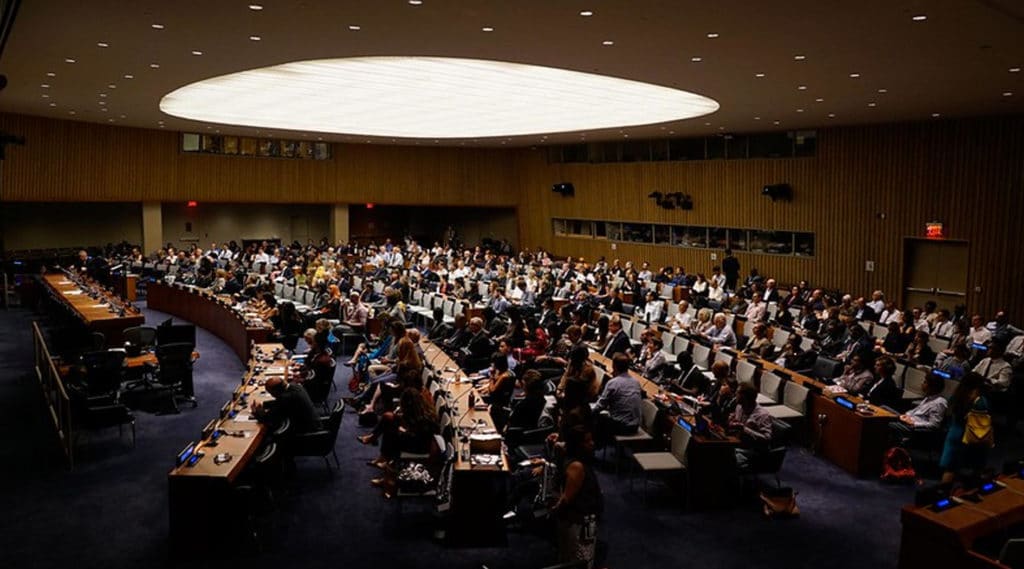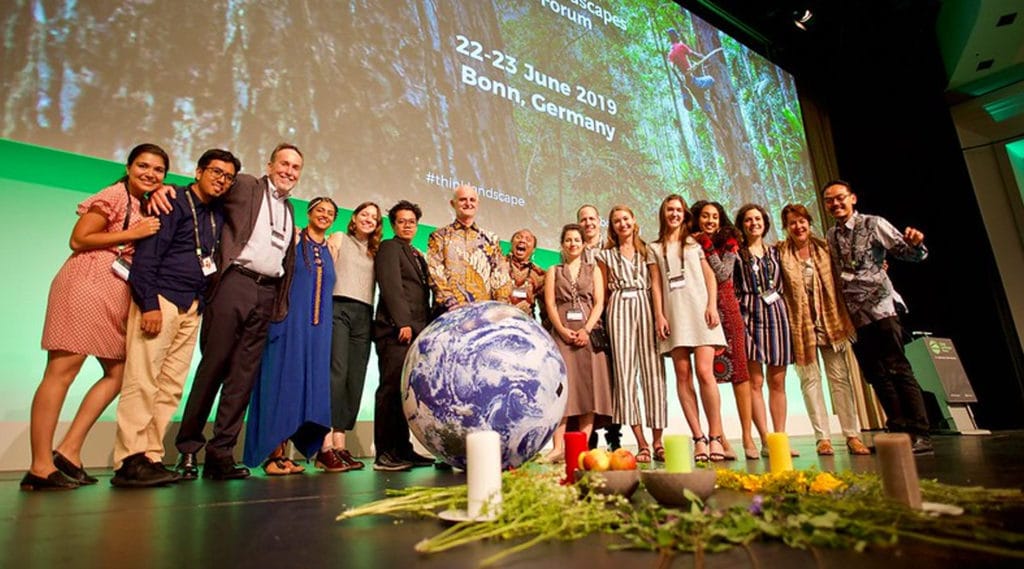Global Landscapes Forum Interview
There’s a ray of hope in the midst of the coronavirus pandemic. The impressive speed with which we’ve produced a vaccine proves that major problems can unite us and shows us how we need to manage the world’s landscapes more sustainably to avoid another pandemic.
Global Landscapes Forum aims to bring the world together to tackle the issue of sustainable land use. It has already reached 800 million people from 185 countries through its conferences, news, social media and community-led activities.
Find out how GLF’s holistic approach is helping to meet the UN’s sustainable development goals.
Listen here or find us on your favorite podcast app.
December 2, 2020
Why Sustaining Landscapes is Important: The Ripple Effect


Why Sustaining Landscapes is Important: The Ripple Effect
To solve humanity's most pressing issues, like climate change and inequality, we must remember that our planet is one intricately connected ecosystem. In this episode, we talked with John Colmey from Global Landscapes Forum about international collaboration and harnessing collective knowledge to deal with shared problems.
What is the Global Landscapes Forum and what is it trying to achieve?
GLF is a decentralized movement that promotes sustainable land use in pursuit of the UN's sustainable development goals. It specifically targets goal 17 - aligning as many international organizations as possible to tackle development issues.
To do this, GLF uses the Landscape Approach. This evidence-based framework is about managing land responsibly, taking both human needs and general environmental concerns into account. The world's peatlands benefit from this holistic thinking. Their destruction doesn't just affect local communities that rely on them for food and leisure. John explains that the conversion of peat landscapes releases devastating amounts of carbon into the atmosphere, affecting the global effort against climate change.
How can you help?
Listen to the whole interview to find out how you can get involved with GLFx, local independently-run communities that champion land sustainability. You can also join the Landscape Academy - GLF's learning platform - and participate in upcoming events. By working together and staying informed, we can catalyse global development.
Want to learn more about the Global Landscapes Forum? You can subscribe to their email list, checkout their news section and follow them on Facebook, Instagram and Twitter.
Great.com was founded in 2017 with the goal of generating donations to stop climate change. The organization operates within the typically uncharitable online casino industry, where it tries to create something good out of something sometimes harmful. Great.com generates profits by competing with traditional casino companies in Google search rankings for online gaming signups coming from search terms such as online slots and best online casino New jersey. All profits are then donated towards causes fighting against climate change. So far we have generated donations of over $1.3 million.
[00:00:00]
Every day you and I get bombarded with negative news. Just like the body becomes what we eat, the mind becomes what we’re putting in. It is important to listen to stories that not only give you hope, but also inspire you and uplift you.
[00:00:17]
In this podcast, we’re interviewing experts who will break down the solutions to the world’s most pressing problems. And I promise you, if you listen to this podcast, you’ll not only stay informed but you will also feel more energy in your life. Welcome to Great.com Talks With.
[00:00:42]
Hey, if you want to contribute to protect them, plant or make sure you like and subscribe to the channel because Great.com is donating 100 percent of profit to funding, the most effective course is to help planet Earth like protect the rainforest or a funding climate change technology. And the topic of today is how do we reach the 17? Global Sustainable Development Goals, Our Strategies, how to reach 17 global sustainable development goals that was created back in 2015 by the United Nations. That kind of works like a blueprint to how do we create a better future for life? And to understand more about that, we have invited our guest today, who John called me. So, John, you work at Global Landscapes Forum. Could you. I want to say welcome before I start to ask you some questions. Hi. Welcome, John.
[00:01:38]
Thank you so much for having me today.
[00:01:41]
John.
[00:01:44]
We’re going to talk about the Global Landscapes Forum, what you do. But before we go into that.
[00:01:49]
I would like to understand a little bit more about the actual problem that you are trying to solve. Could you identify the problem? Is that possible?
[00:02:03]
Yes, I’m I’m I would say I’m happy to, but it’s not a pleasing discussion if you are a religious person, we’re facing an environmental collapse of biblical proportions.
[00:02:18]
There’s fires in California, Siberia, Brazil, Indonesia a few years ago. There’s hurricanes and typhoons in the Philippines.
[00:02:25]
There’s floods. There’s a pandemic. We’re living through the sixth mass extinction, over a million species, according to scientists, could be gone in a decade or two. The temperature is rising so fast that scientists say the Arctic could be ice free at the end of the summer within a few years of this decade. Twenty seven percent of Amazon could be gone by 20 30.
[00:02:52]
The tipping point for an irreversible environmental disaster is twenty five percent. This land degradation, there’s global inequality and it’s made worse by the covid much worse. There’s political unrest and migration that will happen next. We’re seeing and in Peru and we’re seeing in and around the world, in Ethiopia and scientists, political scientists expecting more of it. The problem is it’s all connected. We have to look at the world as one landscape. We can no longer talk about global death and global north and east and west, there’s one world, one planet, and we’re all connected.
[00:03:33]
That is the challenge we’re facing.
[00:03:36]
You’re saying if there’s a wildfire in Australia that is affecting America, Europe, Asia, America, every place on Earth?
[00:03:44]
Absolutely. If you look at the three great forests in the Amazon, Central Africa and Southeast Asia, what happens there affects the areas above it and around the world.
[00:03:56]
The fires in Indonesia were so bad in 2005, it created a major climate event. It will always affect if there’s been research shown that the drought in Brazil caused Hurricane Katrina, it is all connected. Absolutely.
[00:04:12]
So now it’s more a matter of will, I guess, where it would need people to to agree upon that the world is in really bad shape and then our leaders to set the tone.
[00:04:26]
Well, that’s the good news. The good news. And maybe we have a chance. So it’s not over yet. The magic number is 20, 30. And that’s why the stage is you talked about a separate 20, 30. But if you look at covid, you can see both one side of the problem and one side of the answer, one side. The problem is how many lives would have been saved if the leaders would have all worked together, including America, which even now is causing problems for the whole world because people move and people migrate and they travel.
[00:04:54]
But what if they all work together?
[00:04:57]
What would have been the what would have been the answer it showed us is Otto Sharma from MIT said recently. We can focus on one problem at the same time, and we have and we are now and we’re about to have the virus, the vaccine, and we’re going to move that around the world and hopefully in an intelligent, strategic way. But we can’t focus on a problem. We can focus on the environment. If we look at it holistically. It is one problem and it’s all connected.
[00:05:27]
And the reason why I chose the topic here disguised as Global Landscapes Forum, if I understand correctly, is that you are dedicated into of implementing those 17 goals.
[00:05:44]
And if we now look at those 17 goals as a blueprint or like directions, how would you want people to look at those 17 goals?
[00:05:56]
It’s going to be my message throughout and that it’s all connected. Messages were very important. But you can’t look at any one of them, and that’s been the problem, we’ve all been working in silos, agriculture, water, forests, the forests. We’re trying to protect the forest, but agriculture is plowing it down.
[00:06:15]
70 percent of deforestation is higher in the Amazon. You can’t look at agriculture, can’t look at food security separate from gender or community or indigenous rights, the stooges are all connected. And GLF, the global landscape for them is SDG 17, trying to have a global conversation. We’re trying to create a global movement of a billion people that will move in one direction. And our objective is to contribute to achieving the Stig’s and the Paris climate agreement because climate is not separate either. We all have to look at this together. If you just look at forests in 15, ACG 15, it won’t get us anywhere because we’ve been doing that for 50 years and deforestation has taken off as still we can’t turn it around the way we like to.
[00:07:02]
So you’re saying we can’t look at them separately, it’s more how do we align everybody to move in the same direction? And where would you say that we are right now? We just had a big change in leadership from America, which is going to affect, of course, how people are, which direction people are moving. Where would you say that the world is right now in that?
[00:07:28]
Are people about to go through towards the direction that we need to go or are we still too shattered?
[00:07:36]
Well, I think I mean, if you look at if you look at the science, you look at where we are right now, environmentally, we have to achieve we have to reduce carbon emissions by 40 percent to achieve the two degree limit pre-
industrial rise in temperature. We’re not on track to be anywhere near that right now, although covid is helped, if you look at and it’s not emotional, look at Swiss Re, look at the big insurance companies, you know, into 18 of their most expensive years. They don’t get emotional about this. They just look at what they’re facing in terms of risk. Two hundred twenty five billion dollars now. It’s even more this year. I think the world is in shock because the covid. But we have to answer that shock and we have to respond to that. We have time 20, 30, if we all work together, if we move in a solid direction, the good news is we know what to do. And I don’t mean just people in MIT, people in D.R.C., there are scientists. The great thing about the Internet and education, education’s improved all over the world. That’s one thing we’ve done and we’re left. We’re not giving northern answers to southern problems. We believe there’s one problem and we need southern and northern answers to that problem. We can do it, but we are in shock. The election in America, if we see America move in a positive direction and rejoin the Paris climate agreement and provide leadership along with Europe and along with Asia, we can turn this around. There’s no question about it. It’s not unachievable.
[00:09:10]
I want to ask some questions specifically related to the organization that you’re working for, a global landscapes forum to help myself and the people listening to get some kind of idea? What is it that you are doing on a daily basis? What could be a specific project that your guys are working on?
[00:09:34]
Well, I think the global forum was never intended. We never thought it would become as large as it is today in two, 13, and maybe a little bit before that, there was awareness around our charter members, the World Bank, you know, the scientists we’re working with, scientists of forestry, agriculture, water, WWF, all the major organizations, Conservation International. We realized that 2002 to 10 to 13 that we were doing something wrong. Look at that. But we failed on the targets of biodiversity. Climate was going. We’re facing a climate cliff. Every inequality was rising. What had we achieved in development? There was something wrong. And that wrong was we needed to look at it holistically. Now, what we did was this was in two thirteen. And what we did was we took an ecological concept, a science concept called the landscape approach, which looks at any landscape, whether it’s a farm or the Andes Mountains. And we negotiate with stakeholders to get multiple benefits. More more productive, more prosperous, more equitable and more resilient. That’s our goal, to create landscapes. We had one thousand three hundred people showed up in Warsaw at the university there alongside the Cup.
[00:10:50]
Today, we’ve reached something like eight hundred million people. It just grew and grew and grew. And with funding from the German government who said, let’s scale this up. The other thing is digital. covid has so many. Sadness, so many issues about it, and you cannot underestimate how bad it’s been for people, but it did do one thing, it opened up digital for us. We have been catapulted into the digital future, into a digital age. I don’t care what we had before. This is it. Two conferences we had this year had five thousand people attending and reached 50 million people on social media. And it was people from one hundred and eighty five countries. We can have a global conference now. We can have a global conversation. We can have living knowledge where we pass on and accelerate uptake, what is working around the world on any issue. And that’s what your life is about. Now, we’re also working to talk a little bit more, but basically the landscape approach. We look at food and livelihoods. We look at whether we need finance. We need banks to come in and start doing impact, investing on a global level, communities and rights. We talk about gender. We talk about indigenous rights. We talk about tenure rights, which are weak all over in many, many countries and particularly in forest. Restoration, we have to restore the degraded areas and biodiversity and climate. These are the issues that we look at all at once, never one by one, but we will tackle them one by one and then bring and look at it crosscutting. This is what we’re trying to do. We have eight thousand organizations involved, we are knowledge led. That means local knowledge and science knowledge. So anyone you know, thousands of scientists are involved with leading scientists on every subject and from their local communities.
[00:12:34]
So knowledge led and local that and one of the things very, very important community, that we can’t go down and solve any community who can’t go to the next door neighbor and solve their problem or the next country, it has to be solved. The Amazon has to be solved by people in the Amazon, the issues they’re facing. We can’t impose issues. It’s got to be community led. And that’s what we’re all about.
[00:12:58]
Let’s see if I can summarize a little bit of what you saw here, Global Asked Forum was never intended to grow as much as it has grown. Now it’s about.
[00:13:09]
Two hundred.
[00:13:11]
It’s people from 185 countries. We have two hundred two hundred twenty thousand people who have come to our conferences in one way or the other. We have 50000 youth from 80 countries. We have seven thousand journalists
covering us. We’ve had eight thousand organizations. And we’ve reached eight hundred million people on traditional media and regular media.
[00:13:34]
I guess that would be also a way of being like an authority and helping people to direct focus.
[00:13:43]
So I guess if I understood correctly, the organizations behind Global Anarchist Forum, a Center for International Force for Research, United Nations, World Bank and charter members. So there’s kind of multiple organizations who are collaborating, and that’s how we could view the global forum.
[00:14:04]
Yes, global landscape form is not me or any one of us, but it is collaborative leadership and collaborative and collective knowledge. So all the charter members bring something different. So let’s say we take an issue like peatlands. Everyone, no one thinks about peatlands, but they’re huge carbon sources and right now.
[00:14:22]
But eighty five percent of them are still on the ground. If they’re released, if they’re developed, we will never hit any climate target anywhere. You put a fork in the peatlands and they start emitting carbon. We had a conference in Indonesia on peatlands and every different charter member brought a different skill or a different expertise. And then we work with local scientists at the Ministry of Forestry there and others to try to solve it. We came up with policies to work on developing or protecting, and that’s another rule is we have to conserve what we have and sustainably use what’s left. We can’t afford to use our resources that we have left in a natural state. So we try to bring collective knowledge together. CIFOR Center for International Forestry Research. We’re one of the leading centers in the world on forests. We’ve been working on forests of 50 countries around the world for twenty five thirty years. Agroforestry, our merger aircraft, they look at agroforestry trees for US water. Ilari is another charter member. They look at livestock and livestock in Ethiopia, but also livestock in Montana. It’s all the same. And we’ve learned from livestock how they’re doing. They actually do organic farming and livestock in Montana. They do great things there. We can do so it’s collective knowledge and and collective collaborative leadership.
[00:15:50]
It makes it clearer it’s still a little bit abstract for me to understand, but I guess what really is the point here that you’re trying to make is we are all together and we need to solve it on local level anyway.
[00:16:03]
So it’s the. To see the problem with climate change and inequality and poverty as.
[00:16:14]
Coming from one source, you have to, we have to keep it simple, and that’s what we try to do. We are trying to create global landscapes and ultimately one landscape that is.
[00:16:30]
Productive, that means we have to have food, it has to be productive, fisheries have to be productive. We can’t just take livelihoods away. Prosperous smallholders, fishermen, they need to have an income. Equitable, this is critical and this is where we failed so badly, so much so seriously and then resilient, it must be resilient. We can’t get a harvest for one year. We have to get it for 10. It’s a really simple idea. And we want a movement. We were the first we felt we had to change the narrative. We’ve done that. Most of the research scientists in the world, most of the development agencies, the World Bank and others governments talk about landscapes, forest landscapes, farm landscapes. Ocean landscapes, that is, we’ve done that, we’ve succeeded. Eight hundred million people have heard our message. We’re now at an inflection point where we have to get to action on the ground and talk a little bit about what we’re going to do there, because one day, if we’re successful, people will forget the global landscape for. Just like the the green green movement, it’ll be a movement and people will just do it naturally and I’ll be very, very happy if we disappear in 10 years.
[00:17:44]
Um, what would you want we’re going towards down there? What would you want people to do after hearing this into you?
[00:17:53]
Well, there’s several things, several things to do. One is we have just launched and that’s why I say the inflection point. We have a landscape academy where you can learn these and more detailed subjects to learn more about this, but we’ve also just launched something called Gyul Effects. We’re going to set up Jaff chapters of global landscape form around the world. In Brazil. We’ve just launched six of them. One is in Malawi, one is in the Philippines. And they will be community led. They will be led by local communities and they will carry out research or restoration projects on the ground, different kinds of activities, beach cleaning. They will decide what the problems are and they will solve them in the collective knowledge of the charter members. And the scientists will all be there to help them. It will help them raise money, but they are in charge. So we are going to decentralize. Currently, we have a secretariat in Bonn and we’re going to be sharing knowledge around the world. What you could do is, is
you could start a chapter wherever you are. We have them in Europe as well. You can join our mailing list and learn about our events. You can join an event and talk to people you’ve never talked to before. They think just like you, I’ve always said that an Ethiopian farmer and a Montana farmer or a Iowa farmer had the same issues. And what if they could have a conversation together? And they have it’s just scale is different. So join one of our conferences, join the mailing list, just get involved. And we’re not trying to make money and we’re not trying to change the world. And it depends on all of us. Everyone can contribute from the local level to your local community.
[00:19:36]
Thank you. You could start a chapter by going to your local community. Um, uh, you’re not trying to make money. You’re trying to change the world. And one day, if you disappear from 10 years from now, there will be that will make you happy.
[00:19:55]
That’s why I take with me the last question I have is if you would summarize, what is it that you want people to really understand when they leave this to you?
[00:20:11]
It’s all connected. There’s one world.
[00:20:15]
We’re all facing the same issues, we’re all facing the same crisis, we’re all facing the pandemic right now, we’re all facing different issues of income and jobs and climate change and fires and extreme weather. We’re all facing these issues together in different ways in our local community. But it’s all connected. And we can solve these problems if we look at it that way and we look and act, look at these issues and act holistically, look at them and holistically and act holistically. We can get out of this. I’m absolutely convinced of it.
END OF TRANSCRIPT


